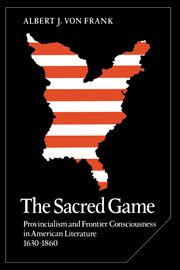Book contents
- Frontmatter
- Contents
- Dedication
- Preface
- Introduction: provincialism and the frontier
- 1 “But enmity this amity did break”
- 2 Brother Jonathan
- 3 “A musy in the thicket”
- 4 Geoffrey Crayon and the gigantic race
- 5 Hawthorne's provincial imagination
- 6 Working in Eden
- 7 Life as art in America
- 8 Reading God directly: the morbidity of culture
- Postscript: tradition and circumstance
- Notes
- Index
8 - Reading God directly: the morbidity of culture
Published online by Cambridge University Press: 07 October 2011
- Frontmatter
- Contents
- Dedication
- Preface
- Introduction: provincialism and the frontier
- 1 “But enmity this amity did break”
- 2 Brother Jonathan
- 3 “A musy in the thicket”
- 4 Geoffrey Crayon and the gigantic race
- 5 Hawthorne's provincial imagination
- 6 Working in Eden
- 7 Life as art in America
- 8 Reading God directly: the morbidity of culture
- Postscript: tradition and circumstance
- Notes
- Index
Summary
Man Thinking must not be subdued by his instruments. Books are for the scholar's idle times. When he can read God directly, the hour is too precious to be wasted in other men's transcripts of their readings. But when the intervals of darkness come, as come they must, – when the soul seeth not, when the sun is hid, and the stars withdraw their shining, – we repair to the lamps which were kindled by their ray to guide our steps to the East again, where the dawn is.
– Ralph Waldo EmersonNothing that Emerson ever wrote with specific reference to Margaret Fuller came quite so close to framing a judgment on her European enterprise as a letter that he composed in October 1857, meant for, but apparently never sent to, Caroline Sturgis Tappan, who was just then tracing the footsteps of her departed friend through Rome and the Brownings' Florence. It is a superb letter, full of those surprising phrases that the mature Emerson so eminently commanded, and suffused, too, with an autumnal feeling of inner and outer weather. “You will never write me again, I have been so ungrateful,” he begins, “I who value every line & word from you, or about you. Perhaps 'tis my too much writing in youth that makes it so repulsive in these old days.”
- Type
- Chapter
- Information
- The Sacred GameProvincialism and Frontier Consciousness in American Literature, 1630–1860, pp. 136 - 153Publisher: Cambridge University PressPrint publication year: 1985

